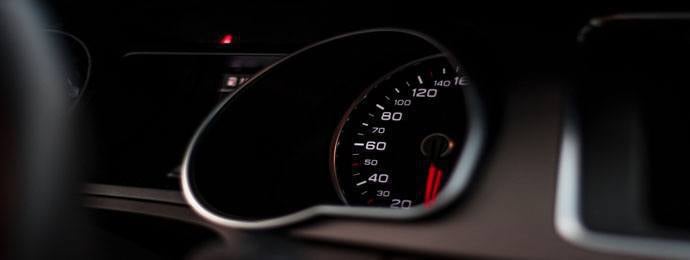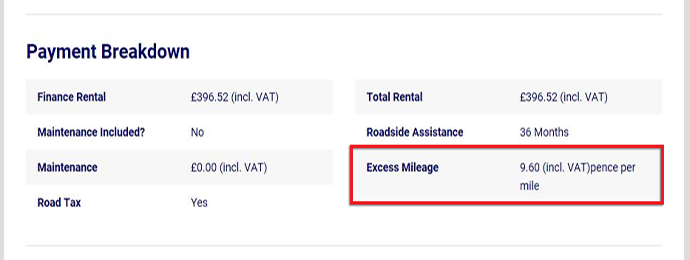Excess Mileage Charges Explained
As a vehicle gets older, it depreciates in value and the more miles it has on the clock, the greater that depreciation. When you take out a new car lease deal, you agree to a set mileage allowance throughout the lease with a cost built into your monthly cost agreement - the more the mileage allowance, the greater the cost.
The annual mileage allowance allows the finance provider funding your lease vehicle to estimate a resale value on the car once the lease period is over. But what happens if you go over that mileage agreement? This is when excess mileage charges come into play.

What are car lease excess mileage charges?
Excess mileage charges are the fees you will pay to the finance provider if you go over your pre-agreed mileage allowance. The excess mileage charge is calculated at a pence per mile rate. Put simply, the more you go over your pre-agreed mileage, the more it will cost you in excess mileage charges.
Why is there a mileage limit on lease cars?
All business and personal contract hire car lease contracts have an annual mileage limit. The yearly mileage, along with other factors, helps the finance provider calculate the vehicle's residual value.
Along with interest rate and tax, a vehicle's residual value is a critical factor in determining your monthly rental cost. This is because your monthly rentals are largely determined by the difference between the vehicle's purchase price and the estimated final sale price.
If you go over your pre-agreed annual mileage, the vehicle's value at the end of the lease contract is likely to be less than anticipated. This is because the more miles a car has on its clock, the more its value depreciates. As such, excess mileage charges are put into place to help protect the finance provider from financial loss if you return the vehicle with a greater mileage amount than pre-agreed.
You can read more about residual value, how it is calculated, and why is it important in our handy Depreciation and Residual Value guide.
How are excess mileage charges calculated?
The finance provider sets the excess mileage charges. This is calculated based on several factors, including:
- The make and model of the vehicle lease hire
- Your total pre-agreed mileage
- The finance provider funding the vehicle
- Whether vehicle maintenance is included
- The total mileage amount on the vehicle at the end of the contract
It is also worth noting that some finance providers have tiered excess mileage. This means that you'll be charged one excess mileage rate for any miles up to a set point, then another excess mileage rate for anything beyond that.
“Excess mileage charges vary from finance provider to finance provider but typically range from around 3p per mile to 30p per mile.”

As excess mileage charges vary, it is important that you check the excess mileage charges before you sign your car finance deal. You will be advised of your excess mileage charge upfront, and this will show on your contract.
How much mileage should I choose for my lease?
One of the most important things to consider when choosing your new lease vehicle is the annual mileage. Choosing a mileage allowance that reflects your driving habits is vital because if you exceed your chosen mileage, you will be liable to pay excess mileage charges.
Your choice of mileage allowance is entirely down to you. If you are confident that your driving habits are likely to remain unchanged from the previous few years, the difference between the mileage amounts stated on your recent MOT certificates will give you a fair idea of the mileage you're likely to need.
Or, you can take a measurement based on how many miles you do in an average month and multiply it by 12. It is best to average this over a year because you may drive more during the winter months when the weather is bad but less during summer months when you typically take holidays abroad, so keep these in mind to make your estimation as accurate as possible.
Can I lease a car with unlimited mileage?
No, it is not possible to lease a car with unlimited mileage. This is because the mileage and other factors are used to determine your monthly rental cost.
If you are looking for a vehicle with unlimited mileage, other options may be available. You may want to consider purchasing a car outright via a bank loan or dealer finance. Or you could consider a Hire Purchase style agreement in which you take ownership of the vehicle at the end of the contract.
What is considered a high mileage lease?
Most car lease agreements have an annual mileage of 5,000 and 15,000 miles per year. A high mileage lease agreement has an annual mileage of 18,000 to 40,000 miles per year.
While high mileage lease contracts are available, it is worth noting that a higher annual mileage will result in higher monthly lease payments. As such, many high mileage drivers choose to buy a vehicle outright or opt for a Hire Purchase style agreement to help keep monthly costs down.
Is my annual mileage tracked each year or at the end of the contract?
Whilst you pre-agree an annual mileage at the start of your lease agreement, the finance provider does not actually track your mileage each year. Only at the end of the contract do they look at your total mileage to determine whether excess mileage charges apply. This means so long as you hand the vehicle back within the pre-agreed mileage perimeters, how you use this is up to you.
For example, if you took out a 24-month lease agreement with an annual mileage of 10,000 miles per year, you could do 5,000 miles in year one but 15,000 miles in year two. As the vehicle is returned with 20,000 miles (or less) on the clock, you will not be charged an excess mileage charge.
“It is up to you to monitor your own mileage, it will not be regularly checked by us here at Nationwide Vehicle Contracts.”

What happens if I exceed the agreed mileage on the lease contract?
If you exceed the mileage allowance on your lease vehicle, any mileage over the agreed amount is charged at the agreed excess mileage rate per mile.
Exceeding mileage on a lease contract example
If the excess stated in your agreement is 5p per mile, and you exceeded your mileage allowance by 1,000 miles, you would be charged £50 at the end of your lease.
How do I find out the excess mileage charges for my chosen lease vehicle?
When leasing with Nationwide Vehicle Contracts, the excess mileage rate will show on your lease quotation (see example below) and your finance agreement. Please ensure you are happy with the excess mileage charges applicable for your lease vehicle before you sign the agreement.

Can I buy extra miles for a leased car?
Yes, most finance providers will allow you to extend the mileage on your lease contract to enable you to drive more miles annually. This is known as a mileage extension.
As a mileage extension is a formal change to your lease agreement, the finance provider will issue you with new documentation confirming the mileage amendment. They will also calculate a new monthly rental, factoring in the increased mileage.
Nationwide Vehicle Contracts also charge a fee of £120 inc. VAT per vehicle for arranging this amendment on your behalf. This fee represents the costs incurred for obtaining the extension quotation, dealing with the contract paperwork and assisting you with the contract amendment.
It is important to note that mileage amendments are at the discretion of the finance company and are NOT available for every contract. You can read more about this option in our Amending the Mileage on Your Lease Contract guide.
Does the car leasing finance provider pay back any leftover miles?
No, if you return the vehicle with fewer miles than pre-agreed, the finance provider will not reimburse you for the unused miles. This is because your monthly rentals were calculated based on the mileage you requested at the start of your contract.
Some finance providers may allow you to reduce your annual mileage mid-way through your contract if you believe you will not use the total mileage amount. This is known as a mileage reduction.
A mileage reduction is a formal change to your lease agreement. This means you will be issued with new documentation detailing the change, and your monthly rentals will also change as a result.
Please note, Nationwide Vehicle Contracts also charge a fee of £120 inc. VAT per vehicle for arranging this amendment on your behalf. This fee represents the costs incurred for obtaining the amendment quotation, dealing with the contract paperwork and assisting you with the contract change.
It is important to note that mileage reductions are at the discretion of the finance company and are NOT available for every contract. You can read more about this option in our Amending the Mileage on Your Lease Contract guide.
How can I negotiate out of a car lease with high mileage?
If you are in the early stages of your lease agreement and are already over your annual mileage, you may want to consider the options available to you. These may include:
- Considering a mileage extension (if applicable) to help avoid further excess mileage charges
- Terminating your lease agreement early, if the early termination fee and current excess mileage costs are less than the costs if you were to continue with the contract
- Swapping your vehicle with a spouse or partner (named on the insurance certificate) who does a lower annual mileage amount to you
What to do if you think you’re going to exceed your mileage allowance
During the term of your lease contract, there may be changes to your circumstances that affect the amount of mileage that you do, such as:
- Moving home or job, which in turn, means you'll exceed your agreed mileage
- Loss of a company or secondary car, which means you'll use your lease vehicle more than expected
- Adding a second driver onto your car insurance policy meaning more drivers will be using the vehicle than anticipated
If this is the case, it may be a good idea to consider the following options which may be available to you.
How to avoid end-of-lease excess mileage charges

Choose a realistic mileage allowance
Think carefully before choosing your annual mileage amount. Don't just consider daily trips to and from work, but also one-off trips you're likely to make, such as day trips with the family, work meetings that might be in a different part of the country and taking your lease vehicle abroad on a family holiday. They all count towards your annual mileage.

Keep your eye on your mileage allowance
Set a reminder to check the vehicle odometer quarterly so you can accurately estimate if you're likely to go over your pre-agreed mileage and, if so, how you can reduce your mileage for future trips. Don't forget, it is up to you to monitor your own mileage. It will not be regularly checked by Nationwide Vehicle Contracts or your finance provider.

Consider swapping with a colleague or spouse
If your lease vehicle is a company car, consider swapping with a colleague who does a lower mileage amount to you to help prevent the vehicle exceeding the mileage quota. For personal lease contracts (subject to approval), you may also be able to swap vehicles with a spouse or partner who does less annual mileage.

Consider a mileage extension
If available, a mileage extension may be a cost-effective way to avoid costly excess mileage charges at the end of the lease contract. A mileage extension is a formal change to your lease agreement that allows you to drive more miles annually.

Terminate your lease contract early
If you are already over your pre-agreed mileage allowance and still have a significant amount of time left on your lease contract, it may be worth considering an early termination. Consider if the penalty costs (early termination fee and current excess mileage costs) are less than the total costs if you were to continue with the contract.
Want to know more about excess mileage charges?
If you have more questions about excess mileage charges, check out our FAQ section or contact one of our Customer Service representatives for more information and advice.
Guide Information
Originally published: 27th July 2016
Last updated: 15th February 2022
